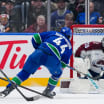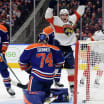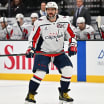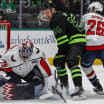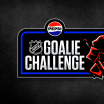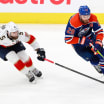NHL.com's Q&A feature called "Five Questions With …" runs every Tuesday. We talk to key figures in the game and ask them questions to gain insight into their lives, careers and the latest news.
The latest edition features New Jersey Devils general manager Ray Shero:
Five Questions with Ray Shero
Devils GM discusses vision for organization, Taylor Hall impact, contract status
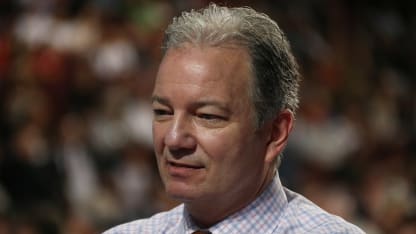
© Dave Sandford/Getty Images
A little adversity to begin the season isn't going to force Ray Shero from deviating from the plan he laid out when named general manager of the New Jersey Devils on May 4, 2015.
The Devils made a 27-point improvement in the Eastern Conference last season and earned their first appearance in the Stanley Cup Playoffs since 2012, but have struggled with consistency out of the gate this season (10-13-6) and are last in the conference with 26 points.
While the start may not be what the fan base expected, Shero remains confident that a little patience will go a long way.
"I've said all along, with the support of managing partners, Josh (Harris) and David (Blitzer), that you don't build a team that's rebuilding through free agent signings that would handcuff you in 3-to-4 years," Shero said. "Doing something for the sake of getting a little bit better, or to just say you're doing something, is patchwork and not a plan. There's only one way to do this. The idea is to build something that once you do build it, you're in a good position each year to have a chance to make the playoffs and at a certain point you're considered a Cup contender.
"We talked about being a fast, attacking and supportive team and we knew it wouldn't happen overnight, but you have to come in with a mentality and a direction. You have to have something you believe in, a vision."
In three-plus seasons on the job, Shero has taken a club that averaged 30.5 years in age in 2014-15 to 26.5 years this season. He acquired forwards Taylor Hall, Kyle Palmieri, Marcus Johansson and defensemen Sami Vatanen and Will Butcher for a total of five draft picks (none in the first round), defenseman Adam Larsson and forwards Adam Henrique and Joseph Blandisi. Even with the movement of picks, the team still had 20 at their disposal. The once bare prospect pool has been replenished, they have salary cap flexibility and a new identity and culture is present under coach John Hynes.
Now in his fourth season as GM, Shero spoke on several key issues in a Q&A with NHL.com on Monday.
Here are Five Questions with … Ray Shero:
What do you say to those emotionally invested fans who want to see improvement over last season?
"Last year gave both hope and optimism. There was light at the end of the tunnel. Our fan base finally saw the vision we talked about my first two years through drafting, developing, and making proper trades; you could see it start to come together. We established something where you could see more talent, more belief and a commitment to hold each other accountable, whether they were younger players or veterans.
"I know we have a ways to go, not just to get to Game 82 (this season), but over the course of the next two or three years. It's all really the start (of our build) I envisioned when I came here. I said last November (2017), that I felt like this is turning. I know it, I've been through this before with Nashville and Ottawa (as assistant GM). With Josh and David, we have stayed true to our plan, no shortcuts. There will be speed bumps along the way, but this is the right way to do it.
"Rebuilds are not for the weak. (New York Islanders GM) Lou Lamoriello once said, 'I have a five-year plan and it's changing every day' so you have to be prepared and have an idea what you want to do for the short- and long-term. We want to be a team that competes for a playoff spot every year and not just by chance or luck, and then from there become more of a contender.
"Our fans have shown their passion. We all felt the excitement last year, as we had a great run at the end of the season and witnessed how electric the building was when we clinched the playoffs at home. We built this the right way and our fans, other teams and the League noticed. We were selected to do the first-ever behind the scenes all-access training camp series, and obviously picked as one of the teams to go to Europe (for the NHL Global Series). That is on- and off-ice progress which we should be proud of."
Your thoughts on Taylor Hall in his third season with the Devils, and how do you think he handled his recent benching by coach John Hynes?
"I once told Taylor that he can't expect to be on his game all the time, but it's how he helps the team win when he's not on. I sent a text to coach Hynes after he benched Hall for the final seven minutes of the second period in our loss to Tampa Bay (on Dec. 3) and asked how Hall was doing.
Reaction to the benching Taylor Hall at end of game
"[Hynes] said he was fine. He said Hall apologized for putting him in a situation to sit him. He respected what [Hynes] did, and he still played him 16:17 and [Hall] said that was more than enough for him to get his game back. [Hall] appreciated the way we treated him and how we held him accountable and knows he has to be better and wants to be better. [Hynes and Hall] have a healthy respect for each other and Hynes was confident Hall would be OK. Hynes told me it was really a reset for him and Taylor's response was great.
"That's the kind of player and person Taylor is. He wants accountability for himself and those around him. What does he do after that conversation with John? He goes out the next day and is the best player in practice, he leads by example. These are the kind of things that prove how driven he is, how much he cares."
Hall, who won the 2018 Hart Trophy as NHL MVP, has one season remaining after this one on his seven-year contract he initially signed with the Edmonton Oilers. The earliest you could sign Hall to an extension is July 1, 2019. How soon will you begin talks on a new contract?
"Taylor and I had dinner at the end of the 2016-17 season, and it ended up turning into this enlightening four-hour conversation covering so many different topics. Taylor was determined after that season. I met with all the veterans at the end of the season and it was clear they all shared their disappointment.
"Based on what his response was, the conversation could have lasted just five minutes. But he said to me this was the right fit. I told him that his legacy is important to me and that I cared about it. When I asked him about Hynes, he told me he was the best coach he's ever had. Once you hear those things, you know you have something together. Taylor came in and transformed this franchise.
WPG@NJD: Hall jams one in from the crease to tie game
"We will definitely talk after the season, and he is a priority, but an announcement, if any, won't come until after (July 1), per league rules. Our feelings haven't changed about Taylor. He's an incredible addition to our team and franchise. Like I said before, he has come in, bought in and transformed this franchise. This is a faster, younger and more exciting team in part because of Taylor. We made a trade for a player that became the MVP which is only the second time NHL history that has happened (Joe Thornton, San Jose Sharks). I think we have a lot of unfinished business and it's been a great fit for both sides."
Why does John Hynes remain the clear choice as coach moving forward?
"The three areas important to me in a coach are an ability to teach, inspire and discipline. There's a fine line between being a friend and establishing a relationship and John has done that with his players. You've got to hold everyone accountable and can't defer to veterans. In three seasons he's shown great growth in how he's dealt with our veterans and young players. John's growth path has mirrored that of our team, and I like to see that. He's taken hard-working teams and helped them accomplish more. He coaches to his players' strengths and helps them find a gear or aspect to their game and brings it to the forefront. He's coached an immensely talented player to become an MVP. Everyone had a great inside glimpse into John with the Behind the Glass all-access series as a communicator, motivator, and his direction as a coach. You have to be honest with yourself as a coach, and sometimes that's not comfortable, but John has matured in that regard, too."
Can you offer your assessment of goalies Cory Schneider and Keith Kinkaid?
"Cory has worked really hard and he's physically fine. There are things we can help him with, but at the end of the day if Cory wants the net back he needs to be the best goalie in practice and that will help him become sharper when he gets into the game. He's got to push Keith and continue to be supportive, too, just as he was for Keith during his run last year. He's been great in that regard. Sometimes it comes down to the player and the player needs to make a difference.
WPG@NJD: Kinkaid makes great glove save on Roslovic
"I tried to hire (goalie coach Roland Melanson) when I was in Pittsburgh (as GM) because I knew of his reputation. Rollie has worked hard with both Cory and Keith. He's helped Keith develop and take the next step and continues to work with Cory, day-in and day-out."
